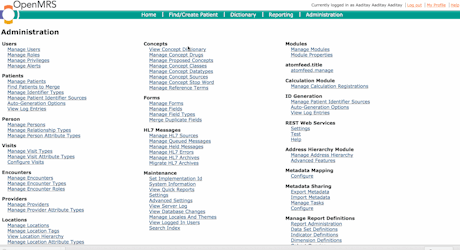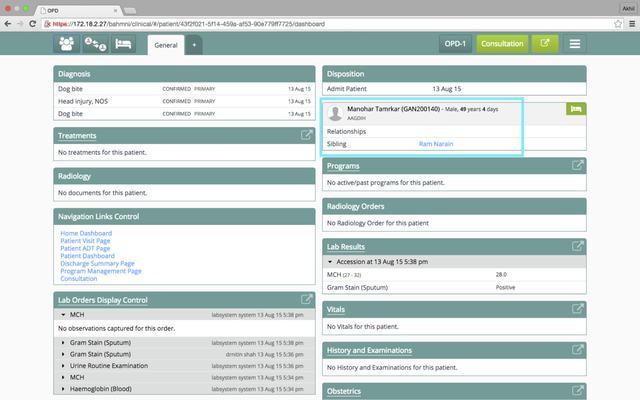Patient relationships
WARNING
This page has been Archived, and is obsolete. It is available on the Bahmni wiki only for reference and historical purposes.
Instead of deleting a page, we prefer to "archive" it, so that it is still available to people who have bookmarked the page.
A patient can have 3 types of relationships:
- Self relationship: A patient may have been registered into a program and can have an ID like GAN200013 and then he is registered in for another program. While registering him to the other program, the patient can be linked with his other id.
- Provider relationship: A doctor/nurse can register a patient or can open a visit. The doctor/nurse can be added as relationship with the patient as a provider.
- Patient relationship: A patient can have relationship with another patient as Father, Mother, Brother, Sister, etc. This helps in tracking and screening prospective patients of communicable diseases like TB, HIV.
Adding relationship types from Openmrs Admin UI:
In the UI:
This section is shown when there is data in relationship_type in the database.
Configuration/Migration:
By default all the relationships are taken as "patient". If a relationship needs to be added as "provider", it can be done in through the global property configuration.
A global property configuration has to be added from OpenMRS admin UI like below:
Navigate through Administration -> Maintenance -> Advanced Settings and add the following
Name: 'bahmni.relationshipTypeMap'
Value: {"provider":["Doctor"],"patient":["Parent","Sibling"]}
CSV Import:
https://bahmni.atlassian.net/wiki/display/BAH/Migrating+Patient+and+Encounter+Data
Adding a relationship:
Provider: If a provider is selected, then from the "Related To" column, auto-complete feature is enabled for the provider.
Patient: If a patient is selected, then based on the identifier or patient name(patient name search is available from 0.91 onwards), the patient is searched and on moving out of the "Related To" it will show the patient details in the bottom as shown below. After adding the relationship, a hyper link to the patient dashboard is show for the relatedTo column.
Adding duplicate relationships will show an error.
We show patient relationships as part of the patient information display control.
The Bahmni documentation is licensed under Creative Commons Attribution-ShareAlike 4.0 International (CC BY-SA 4.0)



